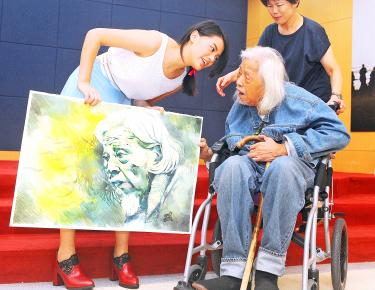Hundreds of people crowded the small auditorium at National Taiwan University’s Alumni Center in Taipei yesterday to celebrate the release of a updated Chinese version of the Taiwan independence advocate Su Beng’s (史明) 1962 book Taiwan’s 400-Year History.
Once banned by the Chinese Nationalist Party (KMT) regime during the Martial Law era, the book was considered a pioneer attempt to recount the nation’s history since the arrival of first wave of Han Chinese settlers, including a few chapters discussing Aboriginal society prior to Han Chinese settlement.
“I decided to write the book because Taiwan’s history has been recounted mostly from the point of view of foreign regimes, whether it was the Dutch, the Japanese or the Chinese,” the 96-year-old Su said. “Because of that, the history of how those in power repressed and exploited the masses is often missing. This is why I decided to write a book from the view of the ruled and the exploited.”
Su explained his idea of “Taiwanese independence,” saying that the difference between “Taiwanese” and “Chinese” is not a nationalistic issue, but a class issue.
“The majority of Taiwanese are descendants of Han Chinese settlers from [China’s] Fujian and Guangdong provinces during the Qing Dynasty, and so were most of the officials at the time, so how were they different?” Su said. “Well, the officials represented the ruling class, they were part of the repression and the exploitation, they came from China, and they would return there a few years after their terms were over. On the other hand, there were settlers who might have been from China as well, but they would stay, they would work until they dropped, but they were exploited — that’s the difference.”
Su said that since the Qing Dynasty, there have been innumerable uprisings by locals against the ruling class, and the KMT government today is no different from Chinese officials during the Qing Dynasty.
“The KMT school education would not tell you this,” Su added.
Metal band Chthonic lead vocalist Freddy Lim (林昶佐) said he supports Taiwanese independence and human rights because he was inspired by the book 20 years ago.
“The book was not an easy read because we have been brainwashed by the KMT’s education system and are used to understanding history from the rulers’ viewpoint, but Su wrote the book from the point of view of ordinary people,” Lim said. “We must adjust the way we look at history to understand what Su tells us in the book.”
Lim said that Su does not look at Taiwan and China from a nationalistic point of view, recalling a visit to Su’s house.
“At his place, he prepared authentic Chinese-style dumplings and noodle soup for us, and we were surprised how a man who advocates Taiwanese independence would make authentic Chinese cuisine,” Lim said. “But when we asked him about it, he simply told us how to make good dumplings — because the question we asked did not exist in his mind.”
Alliance of Referendum for Taiwan convener Tsay Ting-kuei (蔡丁貴) spoke about how he met with Su for the first time in 1981, when Tsay was studying in the US, and he read the book secretly since it was banned in Taiwan at the time.
“I found the book interesting at the time, but I could not fully understand it,” Tsay said. “But now I understand how Su is trying to guide the people of Taiwan and warns us against the mistakes of the past with this book.”
Source: Taipei Times - 2014/09/01





















